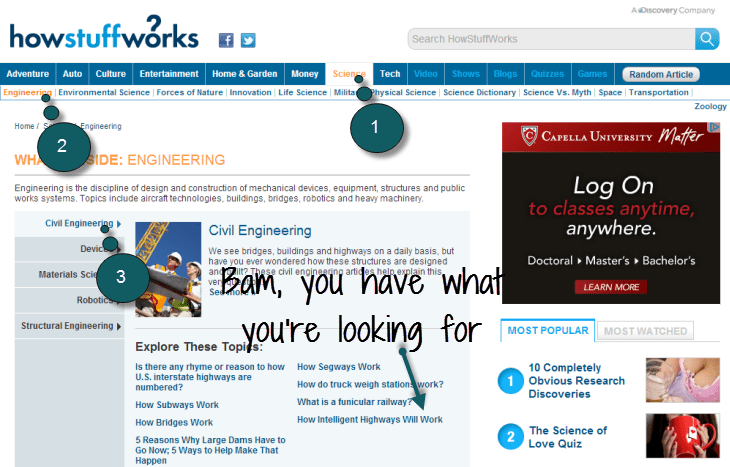If any website can explain the Heisenberg Uncertainty Principle to a fifth grader, it is HowStuffWorks.CommonSenseMedia The editors of TIME magazine feature the website in their Complete List of the 25 Sites We Can’t Live Without. Considering the fact that Discovery Communications bought HowStuffWorks for $250 million, their emphasis on quality should come as no surprise.Wikipedia They use various forms of media to explain a wide variety of complex subjects. They are the masters of explaining the science of stuff. Their tagline is, “Learn how everything works,” and you can expect photography, diagrams, and videos that explain some of some of the most complex subjects.
Marshall Brain, a former North Carolina State University professor, first decided to get into the science of stuff and formed HowStuffWorks in 1998.TechCrunch In 2002, a vulture fund named Convex Group purchased HowStuffWorks for a little bit over $1M dollars.BizJournals 5 years later, Discovery makes their biggest online purchase and buys HowStuffWorks for a quarter billion dollars.PaidContent Credit of the investment return can be given to Jeff Arnold, the same person who founded WebMD.Forbes
Articles, Lists, and Short Videos that Explain the Science of Stuff
HowStuffWorks’ large collection of articles is astounding and they are constantly publishing new articles. On a typical day, you can expect articles like 10 Really Smart People Who Did Really Dumb Things, Who Owns the Internet?, and What will the Earth look like in 500 years? scattered around their homepage.
The video section is equally as great, if not more so. Their videos are professionally produced and almost always worth watching. The videos are generally short and often use entertaining dialogues. Alternatively, you can check out their Featured Videos of the Week! channel on YouTube. Members of HowStuffWorks can even upload their own how-to videos.CrunchBase
HowStuffWorks does a great job at categorizing their vast collection of edutainment articles. They categorize their articles into eight main categories. These categories are Adventure, Auto, Culture, Entertainment, Home and Garden, Money, Science, and Tech. They then separate these categories into different sub-categories. For instance, under the Science category you will find the Engineering and Science vs Myth sub-categories.

Their organization continues. Under the Engineering sub-category, you will be pleased to find their articles categorized by the type of engineering they cover. In their Civil Engineering section, we particularly enjoy their article on How Intelligent Highways Will Work. It is quite possible this is because of the awkward impact Modern Marvels Superhighways left on us.
Shows, Blogs, Quizzes, Games and a Sweet Windows 8 App
HowStuffWorks also features shows, blogs, quizzes, games, and podcasts. Their shows are typically longer videos that address the science of stuff. They do not focus on one particular thing like their shorter videos do. The blogs at HowStuffWorks give their content publishers a bit more freedom to write about what they want to write about. So if you find a writer that you like at the main site of HowStuffWorks, you can start following his blog at HowStuffWorks, which is a sub-website of HowStuffWorks. In the blogs section, you will find a much wider variety of content that relates to the science of stuff. You can also log-in with Facebook to play games and take quizzes. They feature both web games and downloadable games.
Like most great websites, they have several apps for different platforms. We keep HowStuffWorks on our Windows 8 start screen. Their slick Windows 8 app provides a great way of learning about the science of stuff without opening your browser.

So What Are You Waiting For?
Get your hands dirty and start learning about the science of stuff. Read a random article at HowStuffWorks.




